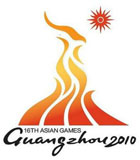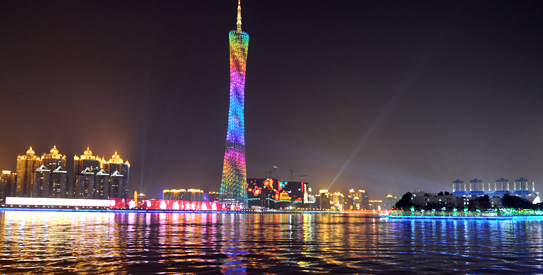GUANGZHOU: The newest decree issued by Asian Games organizers has hit very close to home for local residents.
People living within a one-kilometer radius of the venue for the opening ceremony have been ordered to vacate their homes on Friday for what promises to be an extravagant event staged on an island in the Pearl River.
But don’t turn out the lights, the instructions dictate. Apparently the TV images will look a lot better against an illuminated cityscape.
It’s all in the name of security.
Chinese authorities have spent $2 billion building venues and preparing the city to stage the biggest Asian Games on record, featuring more than 10,000 athletes in 42 sports.
After all the planning to get the city ready and looking its best, they don’t want anything going wrong.
Some downtown subway stations were closed Thursday for security sweeps, and many will be shut down Friday before and during the opener. Nearby high-rise buildings will be vacated, denying vantage points for snipers and thousands of residents.
“Rest assured, everything is in place. Guangzhou is ready,” director of ceremonies He Jiqing stated confidently at a news conference.
“Tomorrow night’s opening ceremony as well as the entire Asian Games will be smooth and grand.”
He suggested people locked out of their homes can go and watch the event on giant screens in designated plazas. Organizers didn’t give details on how many people will be affected. Local media reports of what relocated residents were being offered for their hours of homelessness varied from accommodation at luxury hotels, to free trips to the cinemas or financial compensation.
Friday is a holiday in Guangzhou, easing pressure on a public transport system which otherwise would have been strained by subway station closures and the fact that half the city’s cars have been ordered off the road to reduce pollution and traffic congestion during the games.
The football tournament which started Monday will go into recess on Friday and resume on Saturday, when the games really get underway and the first medals are awarded.
The indigenous Chinese martial arts will get a window for wide exposure Saturday morning, with wushu scheduled to deliver the first gold medal of the games in the men’s changquan discipline.
That has put Yuan Ziaochao right in the domestic sports spotlight, and he’s already tired of the attention.
Yuan won the event at the last Asian Games at Doha, Qatar, in 2006 and won world championship titles in the years either side of that.
“Nowadays, too many media focus on him, making him a bit annoyed,” Yaun’s coach He Qiang said after a training session Thursday.
“We seldom let him communicate with the media directly.”
So as for Yuan’s status, He reports: “After 50 days intensive training, Xiaochao’s training is going on schedule.”
The Chinese have entered in 10 wushu events, and expect to win all of those. But in the interests of being good hosts, they don’t plan to monopolize all the gold medals.
Wushu team manager Gao Xiaojun said China didn’t enter three events, “so other countries can have a chance.”
“Our goal isn’t only to get the gold medals … we hope to spread Wushu around the world and improve it,” Gao said.
Although he wasn’t expecting Yuan to be an ambassador for the sport until competition starts.
“Every athlete has big pressure, especially the first gold medal of the Asian Games,” he said.
“We will give him his own space to relax. We hope the media do not disturb him and give him a relaxed environment.”
In football matches Thursday, defending champion Qatar advanced to the second round with a 2-0 win over Kuwait, which also qualified despite the loss. India beat Singapore 4-1 and Thailand and Maldives played to a scoreless draw, allowing Thailand to also advance.
Earlier, United Arab Emirates and Hong Kong both progressed to the second round. UAE beat Uzbekistan 3-0 and Hong Kong defeated Bangladesh 4-1.
As well as precision planning on building and security, Chinese organizers took measures to avoid embarrassment during the games by conducting 1,950 pre-games doping tests.
Every one of the almost 1,000 athletes in China’s Asian Games team has been tested at least once in the pre-competition phase.
“We hope that China will keep a clean record. We have been working hard to send a clean team to the Asian Games and ensure there is no positive case in our delegation,” Jiang Zhixue, anti-doping chief in China’s State General Administration of Sport, told the official Xinhua news agency.
“No athlete is allowed into the team before they finish the required anti-doping education, no matter how great their sport achievements are.” – AP






